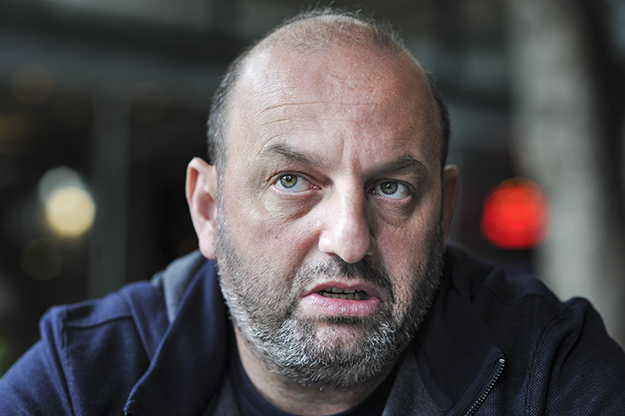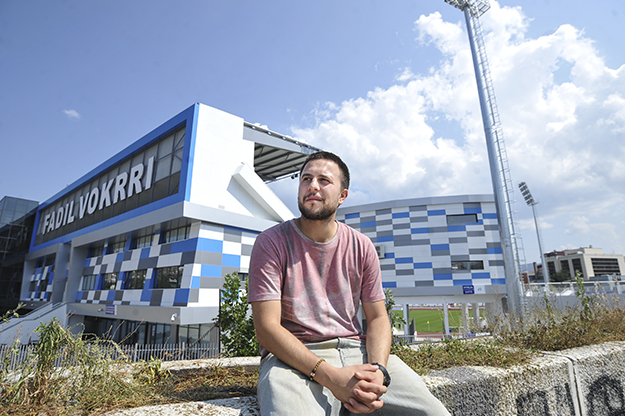In the early post war years, to work as a sports journalist in Kosovo was a challenge in itself. Numerous cases of violence — both by club officials and fan groups — were constantly accompanying the profession.
Edmond Thaçi, vice president of the Association of Professional Sports Journalists of Kosovo (ShGSK), claims that the situation now is much better for sports journalists, despite some minor, mainly technical, obstacles.
However, Driton Latifi, a sports journalist with a lengthy career behind him, argues that although the impression of improving conditions for the work of a sports journalist has been created, the situation is still difficult — and it is necessary to have courage to explore the more risky investigations into sport in Kosovo.
ShGSK has 116 members, all journalists, photojournalists and camera men covering sport. Even though the organization was founded immediately after the war, the association did not act in continuity, and the mandate of its boards have never been fully completed. However, the current board has been in place since 2015, and looks set to be the first to complete its whole term, with its mandate ending in 2019.
Speaking for K2.0, vice president of the board Thaçi said that in contrast to other areas, like politics or economics, sports journalists have fewer barriers. “Especially in recent years, the number of threats on sports journalists has dropped dramatically, although there are still some sporadic threats here and there,” he said.

Vice President of the Association of Professional Sports Journalists, Edmond Thaçi, says there are cases of threats against journalists, but they are now less common. Photo: Atdhe Mulla / K2.0.
Since the board formed there have been three cases when it reacted, all involving journalists being barred from entering stadiums, including the Adem Jashari stadium in Mitrovica and the Palace of Youth and Sports in Prishtina, from which Prishtina Basketball Club tried to ban all journalists from KTV. According to Thaçi, after the intervention of ShGSK, everything was resolved.
The vice president did concede that there had been several cases of threats on journalists, but insisted they were not serious. “Earlier, they were more frequent, but now are less common,” he told K2.0. “From 2015 onward, there have been cases of journalists being called on their private number, but people weren’t making serious threats.”
He does though mention that years ago there was “a threat case regarding Prishtina Football Club, about the privatization and accounts of the club — but there was no serious threat to endanger the journalist’s life.”
Latifi was the journalist that dealt with the case involving the privatization of FC Prishtina. He says that he received threats after his piece on the subject, but adds that he would not be tempted to assume that it all happened only because of this case. “I left the justice authorities to deal with the issue,” he told K2.0. “Although it is not that I have received any further answers from them about this case, four and a half years since I reported the [threats].”
Latifi feels that the Association of Kosovo Journalists could have done more in this regard, and that the situation pushed him close to quitting the profession, saying he didn’t feel fully protected by the law.
“This affects the work of all sports journalists,” he said. “There were phone calls, SMS, physical threats, all sorts of things. And, of course, there were situations when, like many others, I wondered if it was worth continuing writing about these problems in Kosovar sports, when you do not have basic protection.”
Power and Sport
The nature of sport – especially football and, to some extent, basketball in Kosovo – means that many of the clubs are either directly or indirectly linked to politics or big business. This has left the public to wonder whether these powerful people influence sport, but also how free journalists are to report on the subject.
Edmond Thaçi says there has been a tendency for certain clubs to retaliate against journalists over their writing, trying to stop them from entering the stadium. But, he says that they fortunately haven’t accomplished this.
Sports journalist with Klan Kosova Jon Ajeti agrees: “As I know, there are no such obstacles,” he told K2.0. “I am talking about Klan Kosova’s sports newsroom and I say with certainty that we haven’t ever had any pressure from the club leaders, only cooperation, even though they have from time to time complained to our newsroom over some reporting.”

Driton Latifi believes that cases involving connections between big business, politics and sport are going underreported due to fear of repercussions. Photo: Atdhe Mulla / K2.0.
But Driton Latifi has another view. He says there is a direct connection between sport, politics and business. He claims that since the end of the war, there have been several phases of involvement in Kosovar football by groups that have been working for their own interests rather than the sport’s, including criminal gangs.
“We had the initial phase — the war commanders and their impact on football was often talked about in society. Then we have had implications of politics through certain groups, as well as the direct influences of the municipal level of politics,” said Latifi
He highlights the privatization case of FC Prishtina, where Latifi says despite informing the public about what had happened, unfortunately there has been no further investigations. “Even some of my journalist colleagues’ reaction has been somewhat lukewarm,” he says. “They have not pushed this subject further forward.”
Latifi says he knows many of his colleagues who would like to develop a more investigative style of journalism, but fear the situation they may find themselves in, worried about their security, and possible vengeance. “I hope that better days will come — young people with a greater professional commitment,” said the journalist.
While Latifi is concerned for the future of investigative journalism, Ajeti highlights problems in the present regarding more prosaic, everyday reporting. According to him, conditions for sports journalists are not very good for several reasons, including technical issues. At the time stadiums were constructed in Kosovo, it was not foreseen to hold a large number of journalists.

Journalist Jon Ajeti had stones thrown at his head at the Podujevo Stadium after the end of a match. Photo: Atdhe Mulla / K2.0.
In fact, Ajeti himself was a victim of the lack of technical conditions to do the work of the sports reporter. Last year, he was hit in the head by a stone at the Podujeva Stadium, after the Kosovo Cup semi-final match between Llapi and Drenica.
“After the end of the match, along with my colleague, cameraman Alban Bellopoja, we were heading to the dressing room of the players, where we usually get interviews,” said the journalist. “But, on our way there was a scuffle between the two sets of fans. Llapi fans started throwing stones, and one of the stones hit me in the forehead!”
Ajeti adds that problems are even more frequent outside of the Kosovo Super League, in the lower divisions. However, the reporter asserts that the admission of local federations into international associations has changed the approach of clubs, because they already know the importance of respecting the conditions for journalists and the need for a good image.
He also hopes that by getting into European level federation that they have come to understand how to create the conditions for a journalist’s work. Edmond Thaçi agrees with Ajeti. He says admissions “have helped the awareness of the clubs, and at the stage of licensing the stadiums from UEFA, a special space for journalists will also be a condition.” For Latifi though, these practical changes are not enough to contribute to a significant general change.K
Feature image: Atdhe Mulla / K2.0.
![]() This article was supported by the OSCE Mission in Kosovo. The opinions and sentiments expressed are those of Kosovo 2.0 and do not necessarily reflect those of the OSCE.”
This article was supported by the OSCE Mission in Kosovo. The opinions and sentiments expressed are those of Kosovo 2.0 and do not necessarily reflect those of the OSCE.”

